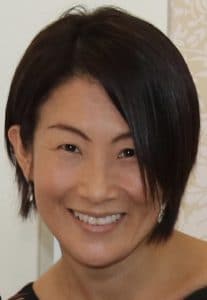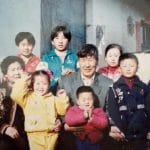
I was born and raised in Japan. I love photography and telling Japanese folk tales and stories with morals and culture especially using Kamishibai (traditional picture cards show). I have a nursing background, having worked as medical nurse for the hospital, public nurse for several companies in Japan and school nurse in the US. I taught Japanese to toddlers in the US. My husband is Irish. Our two sons (12 years and 9 years) were born in the US. We have lived in the US, China, and now in Singapore.
Japan is often called ‘the cleanest place in the world’ by avid travelers. Known for their punctuality, humility and courteousness Japanese are extremely helpful and hospitable people. It is no wonder then that little children taking subways alone or running errands on their own is a common sight especially in Tokyo and other bigger Japanese cities.
Traditionally most Japanese families were three generations together, a big household living in closely-knit neighborhoods and local communities. So besides the parents, children were watched over and disciplined by others in the house or neighborhood. Basic manners, cultural values and morals were role-modeled by parents and other elders.
Modern day Japanese families are now mostly nuclear families with no strong connection with neighbors and communities. Working parents don’t have much support for raising children from others including their employers or Government. Childcare system and facilities and not well developed. Now, as before, mothers take up most of the childcare and household responsibilities.
I grew up in a traditional family with three generations, in a countryside of Japan. My role as a young girl, was giving fresh water and cooked rice to our family’s Buddhist altar and pray for our ancestors, every morning.
My grandparents were the centre of our lives. Meals were cooked to suit their requirements and were served them first. We were always taught to respect elders because they are wise, experienced and are our roots. Many Japanese folk tales also are about respecting the elders. Elders equals wisdom in Japanese culture. They had a commanding presence in Japanese traditional households. Just their presence in the family helped parents raise their kids with the values they lived by. Grandparents were the absolute being, back then.
I still remember that one day I was listening to Grandfather talk and I simply had a question, so I started asking but was quickly told off by Grandmother. I now know that they were not just being strict but thoughtful and cultural.
Elders in the house modeled the Japanese values of discipline, respect, humility and hard work.
New Year used to be a big celebration at home. Preparations would start much ahead of the new year. I really liked that. Grandmother would gather all her grandchildren and we would make Mochi together, the classical way. She would cook a lot of sweet rice and pound it in a large wooden mortar to make very sticky dough. Once the dough was ready, she would divide it into small pieces, put red-bean paste inside each and then pass it on to us children who would be sitting (rather patiently) around the big wooden board.
She would explain us the meaning of preparation for new year; that ‘mochi is a symbol of rice cultivation and special holy food which spirits lodge in. Preparing and offering mochi to God is a joyous and appreciative moment of the year’.
Each of us would then form a mochi with our piece, saying, “it’s hot” laughing “look at this shape” giggling “oh, he is already eating.”
Grandmother would simply smile at us. After making mochi, we shared it with the families in neighbourhood and wished everyone a wonderful new year. It is my precious memory.
In olden days, grandparents would set house rules, be strict and discipline their grandchildren. However times have changed now. Nuclear families are on a rise, especially in urban areas. Today’s grandparents, because they only meet occasionally, often spoil their grandchildren with treats, gifts and leniency.
Nisetai Jutaku is common today in Japanese cities. Nisetai houses are designed for two adult generations to live together, yet separate from each other – with separate kitchens and bedrooms. They are convenient – elders don’t have to stay alone, younger families get childcare support from grandparents and yet no one needs to adjust to others’ preferences of food, lifestyle or entertainment.
Looking at our parents’ back
We grew up learning from ‘looking at our parents’ back’; from their actions. My mother worked part time and also helped on grandparents’ farm. So, she actually had no time to mention to me to study. But I knew well what is expected of me and what I would better do. So without anyone telling me, I studied on my own initiative. Seeing my mother work so hard, I did household chores to help. I was also quite independent as a child.
At the elementary school, we had a moral class once a week. Referring some short stories, we discussed and exchanged ideas about what we learned. The morals were often; Respect Elders, Don’t Harm Others, Be Patient, Good and Evil, Retribution, Importance of Fate…
Traditionally in Japan, co-operation and community is more important than the individual. So, being modest is essential.
If we did well in studies or at a sport, it was most likely that we were never praised by our parents. Instead, we were expected to do even better. Japanese, traditionally, are known to not be very expressive of love or thoughts. The social norm was to be modest. And talking about one’s own achievement or complementing one’s own family member was looked down upon as boastful.
Entering ‘good’ university was very important and dream for the parents as it ensured a ‘good’ job. Finding employment at well-known company or entering civil service were most valuable, stable jobs for the lifetime employment system, at that time.
We were always expected to work harder to achieve higher. Looking back now, I feel that there was not much recognition back then for children’s achievements, only an expectation – that children would work harder and do better. Although that did encourage me to be humble, it did not help me to develop confidence or be happy with what I achieved.
Then and Now, Now and Then…
The popular approach today is in contrast to the traditional Japanese parenting. Today’s young parents in Japan, like everywhere else, are quick to praise their children, on every small success or achievement. They believe if they don’t do so, children will not feel motivated to do something. Parents don’t discipline children because they ‘respect’ what children prefer to do. As if easily imitating individualism or foreign values, there are many people who are self-assertive or insisting liberal way of living.
As a fact in Japan today, there are young workers who do not have a motivation at work because their boss would not praise them. Teachers are not able to encourage students because lacking motivation, students feel forced. Many terms, in reference to modern parents and parenting, have evolved in Japan – mostly with a negative connotation; monster parents, parasite singles, Hikikomori – modern day hermits.
Growing up in a stricter environment that valued cooperation and now, having lived in multiple countries and cultures, I believe that children should not be burdened with expectations. But, they also do not really need to be praised and complemented every time.
Parents praise and complement their children today, but that is more because that is the trend or as a contrast to what their parents did. It is more of an outward gesture, that does not necessarily come from within. There is still a lack of genuine ‘recognition’. And children can sense that. They know when a parent genuinely means it.
What children really need and what loving parents can give them to help them flourish, is recognition – recognition of their talents, of their hard work and efforts behind their success and achievements, and also of their difficulties and failures.
My two boys are born in the United States of America, in a mixed culture family; I am Japanese and my husband is Irish, and they have lived in several counties. Looking at them I realise that children observe and are sensitive to the culture around them. They do learn to judge well and act wisely according to the cultural norms in different cultures.
I believe, we should trust that our children are strong and wise enough – we don’t have to do everything for them, nor should we protect them from everything.
My favourites, with family
Top three things to do
- Travel
- Soccer
- Read books/tell stories
Top three places to go
- The US, our children’s home
- Ireland, mu husband’s home
- Japan, my home
Books to read/ movies to watch with kids:
- Star Wars Movie
- Love You Forever by Robert Munsch
- Kamishibai, any Japanese Folk Tale



